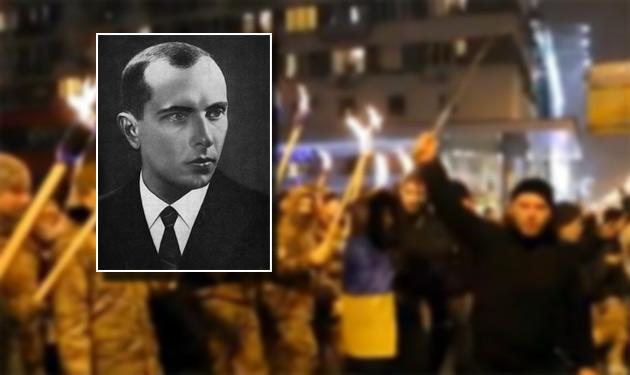Ukraine: New Year's Day saw thousands of extremists marching, journalists attacked

Several thousand Ukrainian extremists marched through Kiev with lit torches on 1 January to mark the 106th anniversary of the birth of Stepan Bandera, the leader of the Ukrainian Insurgent Army. Those participating in the assembly included supporters of the neo-Nazi Right Sector group and radical football fans.
The controversial figure from the era of the Second World War has long divided not just Ukraine, but others in the world. Some in Poland and Russia, for example, are opposed to heroizing Bandera.
As many as 5 000 participated in the march down Kiev’s main avenue. At the Maidan Square they held a "people’s congress", where they chanted slogans such as "Heroes don’t die, the enemy does!", "Glory to the nation", "Death to our enemies", or "The noose for the Bolsheviks, a knife in the ribs to the oligarchs".
The march was convened by the nationalist ultra-right Freedom Party, which is demanding that Bandera be restored the status of National Hero of Ukraine, which had been awarded to him in 2010 by Ukrainian President Viktor Yuschchenko before his successor, President Viktor Yanukovych, rescinded it. "The current government got into power thanks to Bandera’s slogans, so it should be governed by his ideas," said Freedom leader Oleh Tjahnybok.
The march took place without any larger incidents. A small group of Right Sector neo-Nazis attacked a camera crew for the Russian television station Lifenews, which is significantly pro-Putin, breaking their camera and detaining the crew.
The neo-Nazis pushed reporter Zhanna Karpenkova to the ground and stole her mobile phone. The Russian Foreign Ministry called on "the international news community, human rights defenders and anti-Fascist organizations" to respond to the assault on the Russian journalists.
Russian diplomats said the incident was one of "blatant persecution" and a "violation of freedom of speech", reported news server Newsru.com. Police in Kiev announced they have arrested and charged the person suspected of attacking the Russian television crew.
Libor Dvořák of Czech Radio described the situation between Russia and Ukraine as follows on 2 January: "Russian state television once again exploited the events around the commemoration of Bandera’s anniversary in Ukriane, as they do every similar opportunity, to emphasize [what they term] the Fascist nature of the current Ukrainan political leadership, which came to power last spring only thanks to a violent putsch."
Stepan Bandera – admired and hated
In 1929, as a 20-year-old, Stepan Bandera joined the Organization of Ukrainian Nationalists (OUN) and five years later participated in assassinating Polish Interior Minister Bronislaw Pieracki. His death sentence was commuted to life in prison and he left prison after Poland was defeated by Nazi Germany.
At that time the OUN split into two wings and Bandera led one of them. Shortly after Germany began its attack on the USSR, Bandera also participated in announcing an independent Ukrainian state, a move he refused to rescind despite pressure.
Bandera spent the next three years in German concentration camps, but his movement continued to function, and in 1942 the Ukrainian Insurgent Army (UIA) was created. They collaborated with the Germans in some places and fought against them in others.
The UIA brutally expelled Poles from what is today western Ukraine, an action that reportedly cost the lives of as many as 150 000 people. After the tide of the war turned, the main rival of the UIA became the Red Army and the Soviet secret service, the NKVD.
The Ukrainian nationalists’ fight with the Soviet regime lasted in some regions until the beginning of the 1950s. After the official end to WWII, some Ukrainian nationalists attempted to break through to the West by traveling through what was then Czechoslovakia, but must of them failed.
Bandera made it through to West Germany, but in October 1959 he was murdered in Munich by a Sovet agent, Bohdan Stashynsky. At the start of the 1960s, Stashynsky fled to the West himself.
The West German Supreme Court convicted Stashynsky only of abetting Bandera’s murder. The court found that the real perpetrators were the "highly-placed architects of the crime" in Moscow.